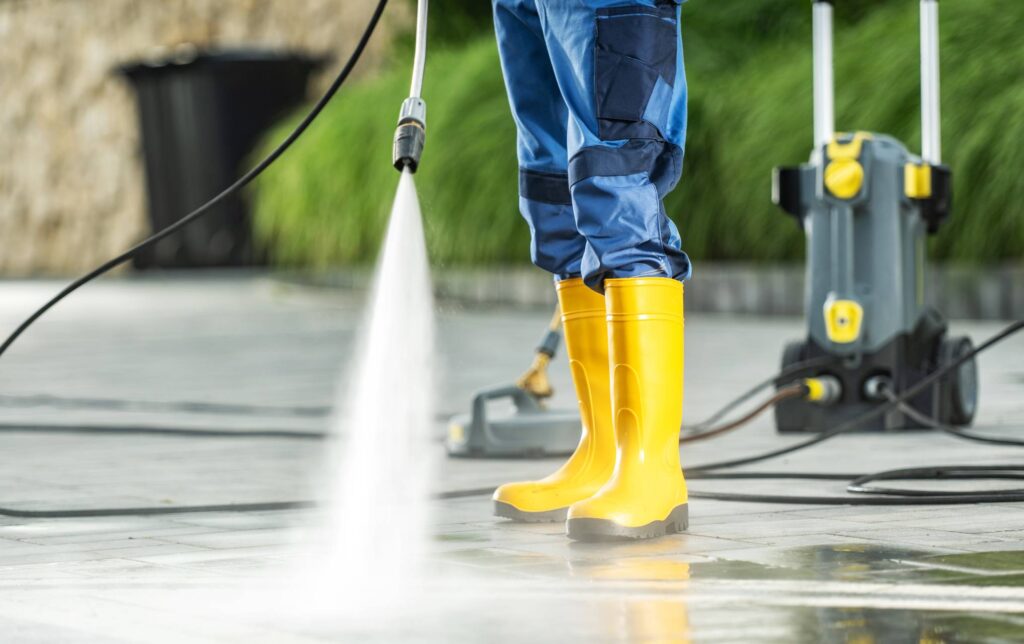Walk past a freshly pressure-washed driveway, and you can’t help but notice. It’s brighter. It feels newer. It catches light in a way you didn’t realize mattered until the grime was gone. The same goes for siding, walkways, rooftops, and fences. Pressure washing transforms spaces—and yet, most people don’t know what’s actually happening when water, at high speed, changes the entire appearance of a surface.
But there’s more to pressure washing than just cranking up a machine and blasting away dirt. In fact, using the wrong pressure or the wrong technique can do more harm than good. The effectiveness (and safety) of pressure washing comes down to a balance between science, surface knowledge, and real-world technique.
At Max’s Window Cleaning | Pressure Washing, understanding this balance is central to the work. Because when it’s done right, pressure washing doesn’t just make things clean—it preserves, protects, and prolongs.
Understanding PSI and Surface Sensitivity
The Role of PSI in Cleaning
PSI, or pounds per square inch, is the measurement of water pressure used in cleaning. Most residential pressure washers range from 1,300 to 3,000 PSI. That range makes a huge difference depending on what surface you’re cleaning.
Cleaning vinyl siding may only require 1,500 PSI and a wide-angle spray tip, whereas oil-stained concrete might demand 3,000 PSI with a narrow stream. But if you mistakenly apply that same high pressure to wooden decks or aging roofs, you risk stripping paint, scarring wood grain, or dislodging shingles.
Matching Technique to Material
Knowing the pressure isn’t enough—you have to know the surface. Porous, brittle, painted, or sealed materials all react differently. The right PSI, nozzle angle, spray distance, and motion transform pressure washing into a precise, safe method rather than a blunt-force tool.
Pressure Washing vs. Power Washing vs. Soft Washing
The Temperature Factor
While often used interchangeably, pressure washing and power washing aren’t the same. Power washing uses heated water, which breaks down grease and grime more effectively, making it ideal for commercial kitchens or driveways. Pressure washing, without heat, is typically safer for residential surfaces like painted siding or wood.
Gentle Alternatives for Delicate Jobs
Soft washing steps in where high pressure would be damaging—like on asphalt shingles, solar panels, or painted exteriors. It uses low-pressure water combined with biodegradable cleaning solutions to gently remove debris, mold, and organic growth without structural impact.
For roof cleaning, this approach is essential. Asphalt shingles can’t handle direct pressure. High PSI can lift shingles, strip granules, and even void warranties. Soft washing ensures safe, long-lasting results.
Specialized Applications: From Gutters to Glass
Gutter Cleaning with Precision
Pressure washing helps with clogged gutters and downspouts, but only when done right. A well-angled nozzle clears paths effectively. Poor technique, on the other hand, can force blockages deeper or damage seams and joints.
Solar Panels and Windows Require Finesse
Solar panels may be tough, but they’re not immune to damage. High pressure can crack the surface or loosen mounting brackets. Instead, professionals rely on soft brushes, purified water, and low-pressure systems to keep panels clean and efficient.
Window cleaning is even more delicate. Professionals avoid high pressure entirely. Using water-fed poles and filtration systems, they leave glass streak-free without harsh chemicals or squeegees. Here, water purity matters as much as the method.
Water Quality and Environmental Responsibility
Tap water contains minerals like calcium and magnesium, which leave spots when they dry. That’s why professional cleaners use purified or deionized water—it pulls dirt from surfaces and dries without residue, ensuring a spotless finish.
Eco-conscious pressure washing also reduces chemical use. With the right nozzles and techniques, many surfaces can be cleaned using just water. Proper runoff control and waste collection prevent contaminants from reaching storm drains, which is especially important in areas with environmental regulations—like those for pressure washing in Los Angeles.
More Than Clean: Maintenance, Safety, and Compliance
Deterioration Prevention
Pressure washing prevents long-term surface damage. Mold, mildew, and algae don’t just stain—they eat away at paint, wood, and concrete. They trap moisture, cause bubbling and peeling, and increase the risk of slips and falls. Regular cleaning is preventive care, not just aesthetic.
Meeting Codes and Expectations
In neighborhoods with HOAs or cities with property ordinances, regular exterior cleaning is often mandatory. Clean surfaces, clear gutters, and mold-free exteriors are often part of lease terms for commercial spaces. Pressure washing ensures compliance with these requirements.
Speed and Professionalism Matter
Manual scrubbing is time-consuming and inconsistent. Pressure washing, when performed by trained technicians, is faster and more thorough. That efficiency is vital for both homeowners and business owners.
For businesses, curb appeal is everything. A grimy sidewalk or stained façade can turn customers away. Clean environments set expectations—they’re silent signals of quality and care. Regular pressure washing, combined with window and gutter cleaning, creates spaces that feel safe and welcoming.
At Max’s Window Cleaning | Pressure Washing, every job is approached with intention, precision, and respect for the materials and environment. Whether it’s a residential driveway or a commercial storefront, the result isn’t just cleaner—it’s elevated.
Conclusion: Behind the Spray Lies the Science
Next time you see a freshly washed driveway or a sparkling window, remember: it’s not just water under pressure. It’s technique, timing, chemistry, and care. The right PSI, the right nozzle, the right approach—these elements come together to protect what matters most.
When done correctly, pressure washing does more than remove dirt. It preserves surfaces, ensures safety, boosts curb appeal, and, in the hands of skilled professionals like Max’s Window Cleaning | Pressure Washing, resets the way people experience a space.







